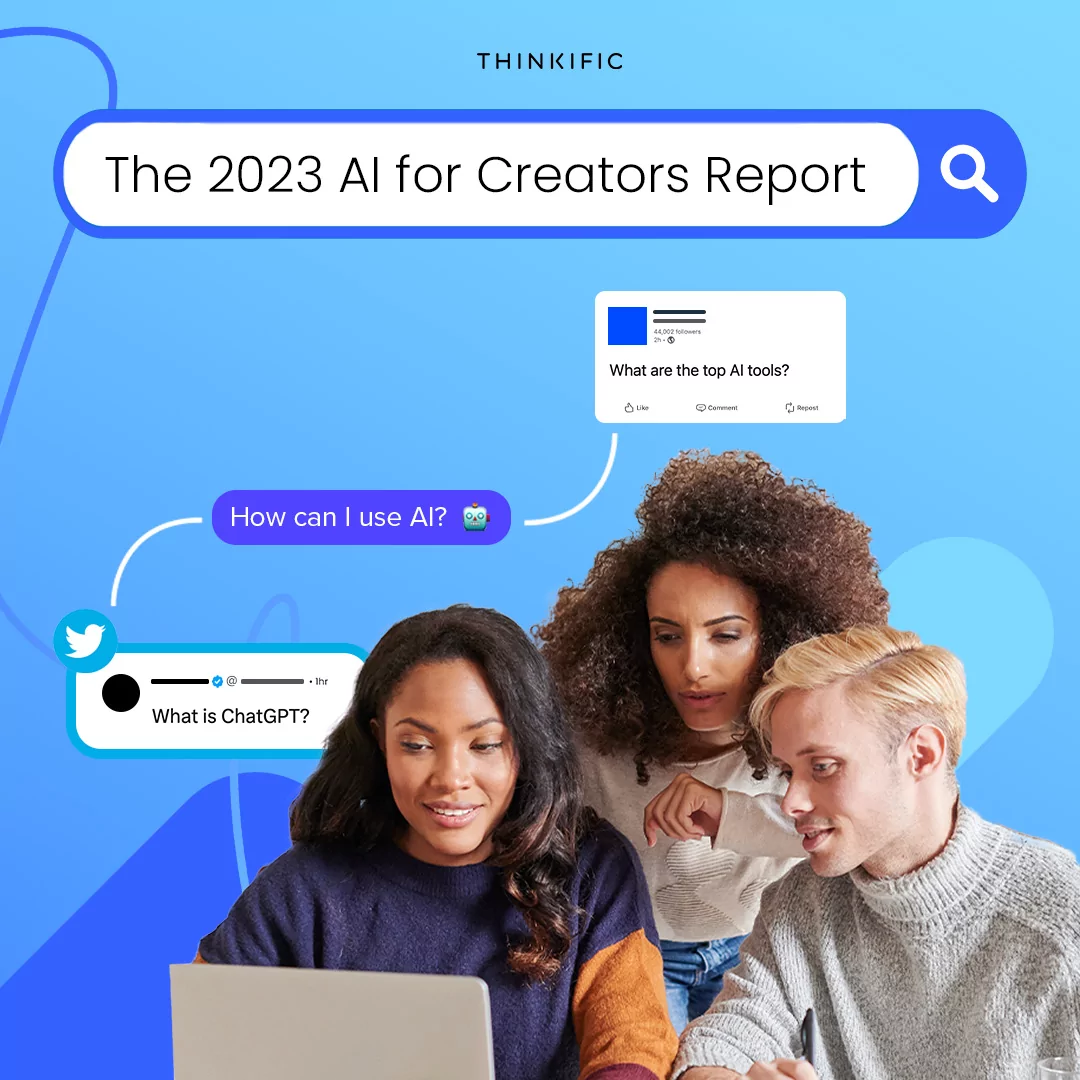2024 has officially arrived, and it’s not too late to start planning your resolutions for the new year. Creating educational content this year is going to bring new challenges like staying up to date with important topics in your niche and keeping in touch with your target audience. But you’ll also benefit from more insights, better software to drive interactivity, and new tools to support your content distribution efforts. While you’re working through your 2024 planning, get inspired by one of these new years resolution ideas!
Looking for help with a specific area of content creation? Jump to a section here:
- Content creation and publishing
- Content promotion and engagement
- Building audience engagement and relationships
For content creation and publishing
- Publish new course updates more consistently so your audience can look forward to new resources from you.
- Plan and schedule course updates in advance which will save you time and improve efficiency.
- Improve content quality by doing more research on your target audience.
- Diversify content formats in your courses by using quizzes, blogs, asynchronous tools, video, or games.
- Try new content platforms (e.g., TikTok, Clubhouse) to attract new students.
- Create engaging headlines and titles by brainstorming and testing them with students in your niche.
- Write in-depth resources that show off your thought leadership skills (and publish them!)
- Incorporate storytelling into your content which will improve student engagement.
- Share personal experiences and anecdotes by building an online learning community or mentorship network.
- Collaborate with other content creators at conferences, in-person meet ups, virtual webinars, or by hosting them on your channels.
- Guest post on reputable websites, podcasts, or courses to demonstrate your reputation in your industry.
- Conduct more interviews with experts which can fuel your course content to be more relevant and up to date.
- Share behind-the-scenes content such as filming course videos, conducting research, or even bloopers of an experiment gone wrong.
- Create evergreen content that helps you build thought leadership and makes you stand out in your niche.
- Conduct content audits and updates on a monthly or quarterly basis to ensure it’s still relevant and engaging.
- Create content series or challenges which provide students with motivation to continue the course.
- Develop a unique teaching style that attracts students and wants them to come back for more.
- Share user-generated content, such as encouraging students to post their own insights they’ve developed from your courses.
- Create content for different target audiences, such as accommodating both beginner or expert-level courses.
- Share content on trending topics like how artificial intelligence is impacting your area of expertise, for example.
- Share your content on multiple platforms. $his makes it more likely for new students to find you.
- Optimize content for mobile users since microlearning is going to continue climbing in popularity in 2024!
- Translate content into multiple languages which allows students from around the world to learn from you.
- Experiment with live streaming, which can be a great video monetization strategy.
- Create shareable infographics which help visual learners understand concepts better.
- Incorporate humor into your content, especially while you’re recording video and livestreams.
- Share content related to current events as you’re likely to pick up higher search traffic from people looking to learn about that topic.
- Write content that educates and informs rather than content that only entertains.
- Create content for specific holidays if it’s relevant to your niche. For example, financial advisors can share how to hold onto your budget during the holidays!
- Promote eco-friendly content that doesn’t create mass amounts of waste such as print-outs. Digital channels are a healthier option for the planet.
- Share content that sparks discussions in online communities like forums, social media networks, or within your own learning center.
- Use interactive content (e.g., quizzes, polls) to keep students engaged in content for longer and to help them retain lessons.
- Develop content around questions that you often hear from students, as they’ll likely have a higher level of interest there.
- Share content that highlights success stories which can inspire students to do great things on their own.
- Create content with clear action items such as downloading an asset, typing a formula, or making a recipe.
- Generate content ideas by conducting audience research and interviewing people in your target niche.
- Focus on evergreen content that is new to your target audience and helps them learn something exciting.
- Create content on niche-specific topics such as film or digital photography, rather than just photography, for example.
- Share content that addresses common problems which will help you attract students who are looking for solutions to those challenges.
- Create content that builds anticipation such as a podcast series that releases new lessons every week.
For content promotion and engagement
- Grow your social media following by posting consistently, sharing informative content, and understanding your target audience.
- Engage with your audience regularly through livestreams, sharing new course deals, or responding to questions about your area of expertise.
- Respond to comments and messages promptly, especially if a new student is interested in taking one of your courses.
- Collaborate with influencers for promotions which can help you grow your audience.
- Host giveaways or contests with prizes like free courses, coupon codes, or access to exclusive content.
- Use data analytics to inform content decisions like time of posting and graphics format (ie. images, Reels, videos).
- Leverage user-generated content for promotion, especially when a student is raving about one of your resources!
- Share content in Reddit or Facebook Group communities that are relevant to your niche.
- Experiment with paid advertising to generate more leads (and don’t forget to use geographic or demographic segmentation!)
- Develop an email marketing strategy to inform students and leads when new content is available.
- Build and segment your email list so that students, alumni, and leads all receive curated content from you.
- Create engaging subject lines for emails to increase the likelihood of the message being opened.
- Send personalized email campaigns that relate to the course(s), behavior, or interests that a student has engaged in.
- Host webinars or online events that encourage students to bring a friend.
- Encourage social sharing of your content, either through giveaways, online communities, or another format of your choice.
- Network with other content creators, especially those that work in a niche that aligns well with yours.
- Share your content in industry forums on LinkedIn to prove your knowledge and grow your reputation.
- Test multiple different social media ad platforms to see which one is best for promoting your content.
- Collaborate with non-profits or causes that align to your niche or area of expertise.
- Share content consistently on Pinterest, especially if you write long-form content like blogs.
- Optimize content for SEO which will help you attract more students from Google, Bing, and Yahoo searches.
- Share content in newsletters, whether it’s your own or one run by an industry partner.
- Partner with affiliate marketing programs that can help you generate additional revenue.
- Promote content through YouTube ads, which will do well if you have a big focus on video content.
- Share content on LinkedIn to connect with other business-minded professionals, or even try to get your content shared on LinkedIn Learning.
- Experiment with content partnerships that can help you co-author educational resources that you may not have otherwise been able to.
- Join online groups and communities where you can learn about hot topics that people want to learn more about.
- Share content on SlideShare or Scribd. This is a no-brainer if your content is already in a document or slide format!
- Create a content sharing schedule so that your audience can get excited about the next update.
- Share content on industry-specific websites. In some cases, you can also do paid advertising on these sites as well.
- Offer exclusive content to subscribers using one of these monetization platforms.
- Share content via email signature which is a sneaky extra way to promote your course.
- Host a virtual summit or conference about your niche area so that you can gather everyone in your target audience together.
- Collaborate on joint venture projects like a co-created course or E-book.
- Share content on niche-specific forums. Reddit is a good place to find very specific forums!
- Share content on your personal website and make sure you’re keeping it up to date.
- Promote content through influencer marketing tactics.
- Participate in social media challenges to show that you’re staying relevant as a creator.
- Share content on podcast platforms which is great for auditory learners to tune in.
- Leverage user testimonials for promotion so that other students can hear how great you are!
For building audience engagement and relationships
- Understand your audience’s needs and interests by doing polls, market research, and collecting feedback.
- Conduct audience surveys and polls on your social media channels or directly from your course platform.
- Engage with your audience authentically, by being honest when you make mistakes, being clear about which advertising placements you’re being paid for, and not over-promoting another brand’s product.
- Build a loyal and supportive community which can take a long time but will happen with patience and building trust with your audience.
- Show appreciation to your followers by offering discount codes, thank you messages, or holiday wishes.
- Share your journey and progress to keep your students engaged with your next plans, especially if this includes a new course launch!
- Highlight user-generated content as a way of showing appreciation to your students.
- Encourage reviews and testimonials to be left on your course platforms or social media sites so other students can see results of your work.
- Respond to negative feedback professionally and in a timely manner.
- Celebrate audience milestones and achievements such as hitting a certain number of podcast downloads or community members.
- Offer free resources to your audience so they can get a taste of your knowledge without having to pay (as not all students are in the position to pay for additional learning).
- Provide opportunities for audience participation such as a contest to name your new course.
- Create a content feedback loop that allows students to communicate what they liked or didn’t like about your resources so you can improve it for next time.
- Use social media to connect with your audience, especially those that aren’t yet students but could convert into a paid subscriber down the line.
- Share content that addresses audience pain points specifically related to your niche. Make sure to showcase how you’d solve those problems!
- Create personalized content for loyal followers such as curated email newsletters with content related to the courses they’ve subscribed to previously.
- Share gratitude and thank your audience on a regular basis on all platforms that you communicate on.
- Recognize and feature loyal fans, whether it’s through user-generated content, pinning their post in your forum, or sending them a direct message.
- Offer exclusive perks to loyal supporters such as lowered pricing on course bundles, referral bonuses, or access to special content.
- Show your audience how you’ve listened to their feedback and adapted your existing educational tools to better suit their needs.
Creating your 2024 resolutions as a content creator in the educational space is a fun and exciting project! While you’re working on designing new material that better addresses your target audience’s needs, try out a learning management system like Thinkific that can help you optimize much of your course creation process. From allowing you to create custom courses, to automatically pulling deeper insights about your learning community, to connecting you to marketing tools that will promote your products across multiple channels, Thinkific is a great place for a growing thought leader to work from! Try it out for free here.






